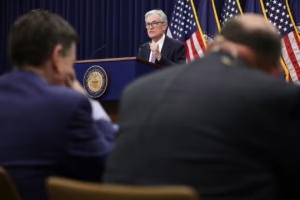The figures: In late May, a consumer mood survey showed some improvement, suggesting that the economic impact of the tariff war with China may not be as severe as initially anticipated.
The University of Michigan reported on Friday that the consumer sentiment survey’s second of two readings increased from 50.8 in early May to 52.2. That is comparable to April’s sentiment level.
A consistent reading of 50.8 was predicted by economists polled by the Wall Street Journal.
A year ago, the index was 25% higher.
Important information: A measure of consumer sentiment regarding the status of the economy rose from the previous estimate of 57.6 to 58.9. In April, the index was 59.8.
After starting at 46.5, the measurement of expectations for the following six months increased to 47.9. In April, the index was 47.3. This year, this measure has been lacking.
Compared to the preliminary report, the final release’s inflation-expectation figures were significantly better.
Expectations for one-year inflation decreased from 7.3% in the early May reading to 6.5% in the final report.
Expectations for longer-term inflation were 4.25%, down from 4.6% in the prior report.
Big picture: According to Oren Klachkin, financial-market economist at Nationwide, consumers are concerned about inflation, their incomes, and the state of the economy despite the improvement in optimism.
The economy is stumbling along, according to actual data and reports from all throughout the nation.
The Conference Board’s consumer confidence index, a different indicator of household sentiment, increased by the largest amount in four years in May.
“Sentiment had ebbed in the preliminary reading for May but turned a corner in the latter half of the month following the temporary pause on some tariffs on China goods,” stated director of consumer surveys Joanne Hsu of the University of Michigan.
“Overall consumers see the outlook for the economy no worse than last month, but they remained quite worried about the future,” she stated.
Market response: Following the release of the sentiment data, the Dow Jones Industrial Average (DJIA) reversed a minor loss.





